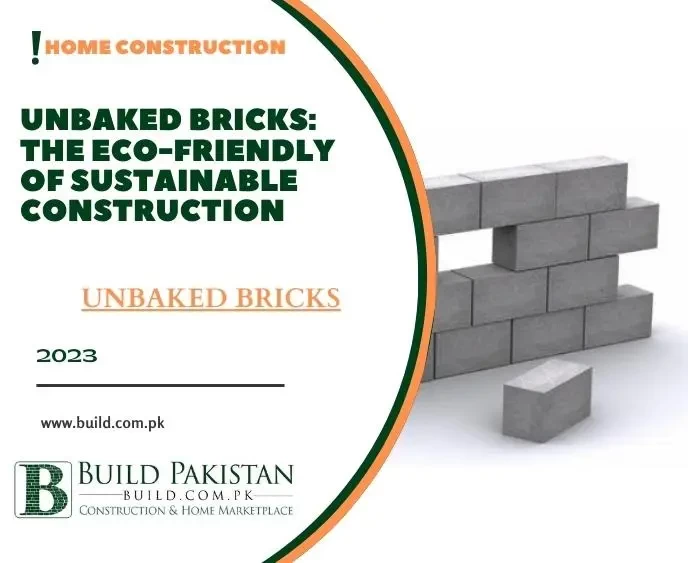Unbaked Bricks: The Eco-Friendly of Sustainable Construction

Introduction:
In the ever-evolving landscape of construction materials,
unbaked bricks emerge as a sustainable and eco-friendly alternative, offering a
harmonious blend of tradition and innovation. This detailed blog explores the
fascinating world of unbaked bricks, delving into their composition, benefits,
applications, and their role in shaping a more sustainable future for the
construction industry.
Understanding Unbaked Bricks
Composition and Production:
Unbaked bricks, also known as "adobe" or "mud
bricks," are crafted from a mixture of natural materials, primarily clay,
sand, straw, and sometimes additives like lime. The production process involves
shaping the mixture into bricks and allowing them to dry naturally in the sun,
foregoing the energy-intensive firing process associated with traditional baked
bricks.
Historical Significance:
The use of unbaked bricks can be traced back to ancient
civilizations, where the availability of natural resources and the simplicity
of the production process made them a popular choice for construction. This
historical continuity showcases the sustainability and durability inherent in
this age-old building technique.
The Environmental Benefits of Unbaked Bricks
Low Energy Consumption:
One of the primary environmental benefits of unbaked bricks
lies in their low energy consumption during production. Unlike baked bricks
that require high-temperature kilns, unbaked bricks air-dry naturally,
significantly reducing the c arbon footprint associated with their
manufacturing.
Minimal Carbon Emissions:
The absence of firing in the production process means that
unbaked bricks contribute minimally to carbon emissions. This aligns with the
global push towards sustainable construction practices that aim to mitigate the
impact of the built environment on climate change.
Biodegradability and Recyclability:
Unbaked bricks are inherently biodegradable, and their
components can return to the natural environment without causing harm.
Additionally, when a structure made of unbaked bricks reaches the end of its
lifecycle, the bricks can be recycled, further reducing the environmental
impact.
Applications of Unbaked Bricks
Residential Construction:
Unbaked bricks find widespread use in residential
construction, especially in regions with a dry climate conducive to natural
drying. From modest homes to more elaborate structures, the versatility of
unbaked bricks makes them suitable for various architectural styles.
Community Buildings:
The eco-friendly nature of unbaked bricks extends their
application to community buildings, such as schools and community centers. The
cost-effectiveness and sustainability of this building material make it an
attractive option for projects with a focus on environmental responsibility.
Sustainable Development Projects:
In the context of sustainable development, unbaked bricks
play a crucial role in projects aimed at providing affordable and
environmentally friendly housing. Their ease of production and the use of
locally sourced materials align with the principles of sustainable and
inclusive urban development.
Challenges and Considerations
Durability Concerns:
While unbaked bricks offer several environmental benefits,
there are concerns about their long-term durability, especially in regions with
high rainfall. Proper construction techniques, including adequate roof
overhangs and proper sealing, can mitigate these challenges.
Code Compliance:
Building codes and regulations vary, and in some regions,
there may be challenges in obtaining approval for structures built with unbaked
bricks. Advocacy for the recognition of this sustainable building method is
essential to overcome regulatory hurdles.
The Future of Unbaked Bricks in Construction
Technological Advancements:
Ongoing research and technological advancements in sustainable
construction materials are likely to enhance the properties and durability of
unbaked bricks. Innovations such as stabilized or compressed earth blocks aim
to address some of the traditional challenges associated with these bricks.
Global Adoption:
As awareness of environmental issues grows, there is a
potential for the increased g lobal adoption of unbaked bricks in construction
projects. Collaborative efforts between governments, architects, and builders
can drive the integration of sustainable building practices into mainstream
construction.
Conclusion:
In conclusion, unbaked bricks stand as eco-friendly marvels
in the realm of su stainable construction. Their historical significance,
coupled with the environmental benefits they offer, positions them as a viable
and compelling alternative to traditional baked bricks. As the construction
industry continues to evolve towards greater sustainability, unbaked bricks are
poised to play a pivotal role in shaping a more environmentally conscious and resilient
built environment.









